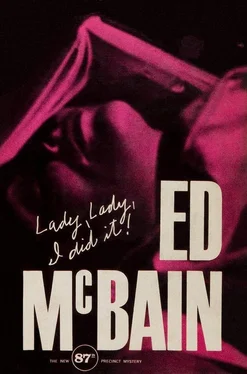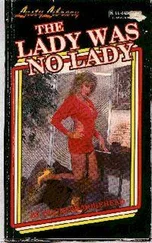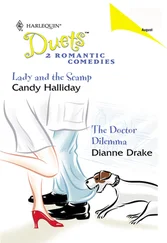“She didn’t go to any hospital, Dr. Madison. She was probably too frightened.” He paused. “How sick was she when she came here Saturday night?”
“She didn’t seem ill. She only seemed confused.”
“Was she hemorrhaging?”
“Of course not! Do you think I’d have let her go if — I’m a doctor!”
“Yeah,” Carella said dryly. “Who happens to perform abortions on the side.”
“Have you ever carried an unwanted child?” Dr. Madison said slowly and evenly. “I have.”
“And that makes everything all right, does it?”
“I was trying to help that little girl. I was offering her escape from a situation she didn’t ask for.”
“You gave her escape, all right,” Meyer said.
“How much did you charge for her murder?” Carella said.
“I didn’t murder!”
“How much?”
“Fi... five hundred dollars.”
“Where would Eileen Glennon get five hundred dollars?”
“I... I don’t know. Miss Townsend gave me the money.”
“When did you and Claire arrange all this?”
“Two... two weeks ago.”
“How’d she get onto you?”
“A friend told her about me. Why don’t you ask her? Didn’t she tell you all this?”
Carella ignored the question. “How long was Eileen pregnant?” he asked.
“She was in her second month.”
“Then... since the beginning of September, would you say?”
“Yes, I would guess so.”
“All right, Dr. Madison, get your coat. You’re coming with us.”
Dr. Madison seemed suddenly confused. “My... my patients,” she said.
“You can forget all about your patients from now on,” Meyer said.
“Why? What did I do wrong? Try to save a little girl from unwanted misery? Is that so wrong?”
“Abortion is against the law. You knew that, Dr. Madison.”
“It shouldn’t be!”
“It is. We don’t write them, lady.”
“I was helping her!” Dr. Madison said. “I was only—”
“You killed her,” Meyer said.
But his voice lacked conviction, and he put the handcuffs on her wrists without another word.
FIRST COUNT
The Grand Jury of Majesta, by this indictment, accuse the defendant, Alice Jean Madison, of the crime of abortion, in violation of Sections 2 and 80 of the Penal Law of this state, committed as follows:
The defendant, on or about October 14 at 1163 37th Avenue, Majesta, did unlawfully, feloniously, and willfully use and employ a certain instrument on Eileen Glennon with intent thereby to procure the miscarriage of said Eileen Glennon, the same not being necessary to preserve the life of the said Eileen Glennon or the life of the child with which she was then pregnant.
SECOND COUNT
The Grand Jury of Majesta, by this indictment, accuse the defendant of the crime of manslaughter in the first degree in that the defendant did unlawfully, feloniously, and willfully use and employ a certain instrument on Eileen Glennon with intent thereby to procure the miscarriage of said Eileen Glennon, the same not being necessary to preserve the life of the said Eileen Glennon or the life of the child with which she was then pregnant as a result of all of which she died on October 15.
Arthur Parkinson, District Attorney
Wednesday, October 18.
Indian summer is leaving the city. There is a chill in the squadroom even though the thermostat has been turned up and the radiators are beginning to clang.
Autumn has arrived suddenly and seemingly without warning. The men sit with their hands wrapped around mugs of hot coffee.
There is a chill in the squadroom.
“Bert, there are some questions we have to ask you.”
“What kind of questions?”
“About Claire.”
The telephone rings.
“87th Squad, Detective Carella. Oh, yes, sir. No, I’m sorry, we haven’t been able to locate them as yet We’re making a routine check of all pawnshops. Mr. Mendel. Yes, sir, as soon as we have anything. Thank you for calling.”
There was something ludicrous about the scene. Bert Kling sat in the chair facing the desk. Carella replaced the telephone in its cradle and then went to stand beside Kling. Meyer sat on one corner of the desk, leaning over, his elbow cushioned on his knee. Kling’s face was drawn and gaunt. He looked for all the world like a harried suspect being grilled by two hardened detectives.
“What do you want to know?” he asked.
“Did she ever mention Eileen Glennon to you?”
Kling shook his head.
“Bert, please try to think back, will you? This might have been in September sometime, when Mrs. Glennon was in the hospital. Did Claire mention having met Mrs. Glennon’s daughter?”
“No. I would have remembered the minute the Glennons came into the case. No, Steve. She never mentioned the girl.”
“Well, did she ever mention any girl? I mean, did she seem troubled about any of her patients?”
“No.” Kling shook his head. “No, I don’t remember, Steve.”
“What did you talk about?” Meyer asked.
“What do you mean?”
“When you were together.”
Kling knew exactly what Meyer was trying to do. He was a cop, and he had used the same technique himself, many times before. Meyer was simply trying to start a train of thought, trying to get words flowing in the hope that they would trigger a significant memory. But, even knowing this, he felt a numbing pain. He did not want to talk about Claire. He did not want to repeat aloud the things they had whispered alone together.
“Can you remember?” Meyer said gently.
“We... we talked about a lot of things.”
“Well, like what?”
“Well... she had a toothache. This was... It must have been the early part of September.”
“Yes, go ahead, Bert,” Carella said.
“And she... she was going to a dentist. I remember she... she hated it. She... she met me one night with her jaw numb. From the novocaine. She asked me to hit her. She... she said, ‘Go ahead, strong man! I’ll bet you can’t hurt me.’ She was kidding, you know. Because... we had a lot of little jokes like that. You know... because I’m a cop.”
“Did she ever talk about school, Bert?”
“Oh, sure,” Kling said. “She was having a little difficulty with one of her teachers. Oh, nothing like that,” Kling said immediately; “nothing serious. The instructor had certain ideas about social work, and Claire didn’t agree with them.”
“What were the ideas, Bert?”
“I don’t remember now. You know how it is in a class. Everybody’s got their ideas.”
“But Claire was a working student.”
“Yeah. Well, most of the people in the class were. She was doing graduate work, you know. She was going for her master’s.”
“Did she ever talk about that?”
“Pretty often. Social work was very important to her, you know.” He paused. “Well, I guess you don’t know. But it was. The only reason we... we weren’t married yet is because... well, you know, she wanted to finish her schooling.”
“Where did you go when you went out, Bert? Any place special?”
“No, just around. Movies, plays sometimes. Dancing. She liked to dance. She was a very good dancer.” The squadroom was suddenly still. “She was...” Kling started and then stopped.
The silence persisted.
“Bert do you remember any of her ideas about social work? Did she ever discuss them with you?”
“Well, not really. I mean, except where it crossed with police work, do you know what I mean?”
“No.”
“Well, where she was puzzled about a legality. Or where she felt we were doing a bad job. Like with street gangs, you know. She thought we handle them wrong.”
Читать дальше

![Дэвид Лоуренс - Lady Chatterley's Lover [С англо-русским словарем]](/books/26613/devid-lourens-lady-chatterley-s-lover-s-anglo-thumb.webp)










